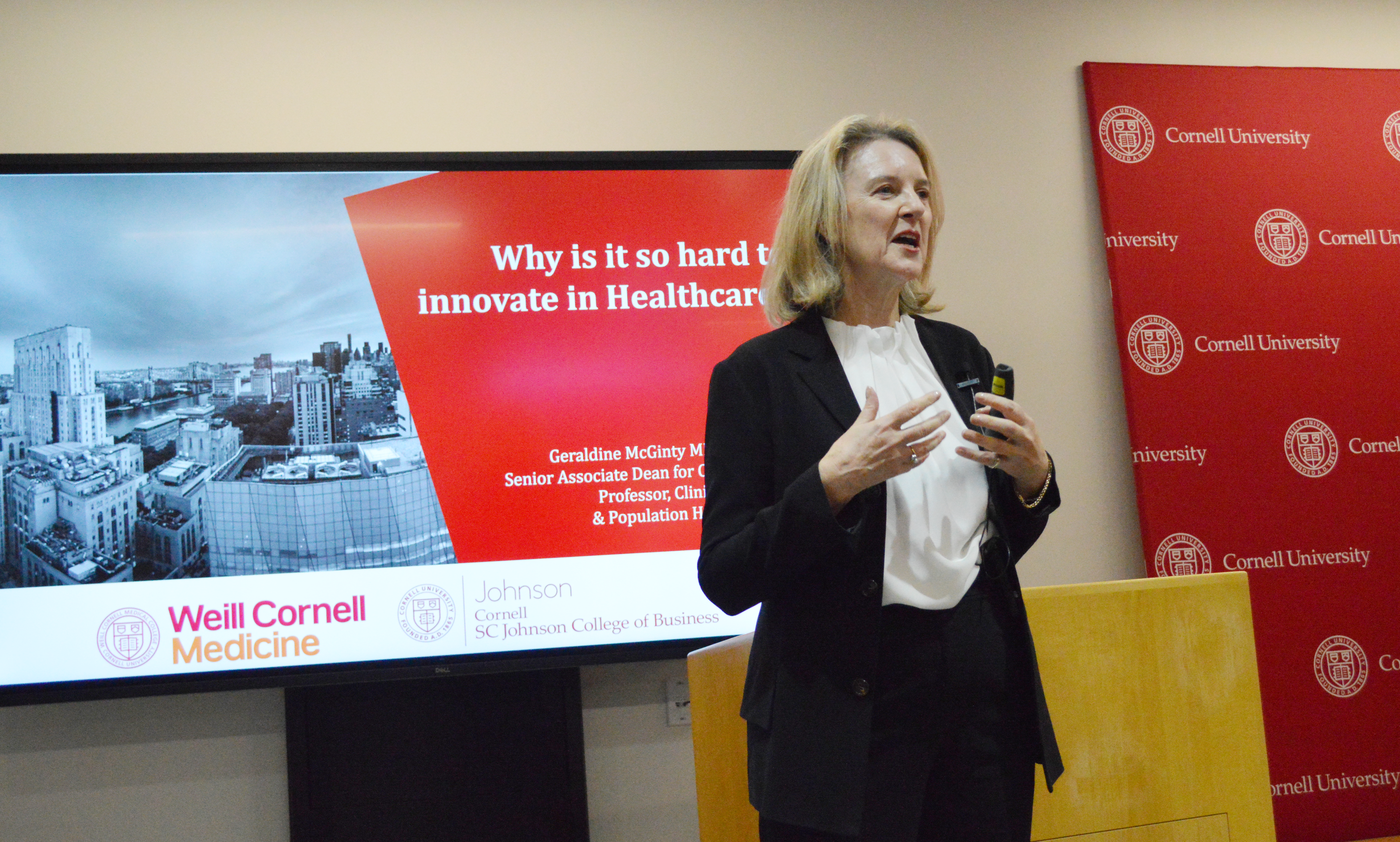
The Cornell Executive MBA/MS in Healthcare Leadership program hosted a networking event for students, alumni, and industry professionals for a thought-provoking conversation on innovation in the health care space. Dr. Geraldine McGinty, senior associate dean for clinical affairs and professor of clinical radiology and clinical population health sciences at Weill Cornell Medicine, led the discussion as the featured faculty presenter.
“Often, we ask ourselves, ‘Why does it have to be this way? Why can’t we make it easier, simpler, and better for the patients we serve?’ These are questions that certainly inform the courses I teach, including one called Health Care Transformation and Innovation,” stated Dr. McGinty. “One of the things we aim to do in this program is help our students unpack this really complex set of stakeholders and incentives in a way that empowers the students to be leaders and innovators.”
In Dr. McGinty’s course, students are challenged to think beyond short-term strategies to develop innovative solutions with lasting impact. This undertaking requires mastering a range of skills, such as understanding diverse stakeholders, scenario planning, defining metrics for success, and fostering an equitable patient experience.
“It's such a privilege to be able to support our students in their journey,” she shared. “We're looking to create leaders for the future who can really make this a better system.”
Dr. McGinty also addressed a critical paradoxical issue in US health care: US health care spending significantly outweighs that of its peer nations, despite achieving poorer outcomes. While technology is where many often look when they seek to innovate, many high-profile organizations’ attempts to fundamentally reshape health care have failed.

Industry professionals, program alumni, and current students connect and share insights on leading transformation in health care.
“Health care is a uniquely disaggregated value chain. The number of stakeholders, from patients to investors, is significantly greater than many other sectors,” explained Dr. McGinty. In recent years, more physicians have gone from being independent providers to members of larger health care entities and corporations. This transition impacts the dynamics of care delivery and the incentives for innovation. Another barrier was revealed during the pandemic. With an increase in the use of telehealth and other digital solutions, providers saw a discrepancy in access to broadband. Additionally, the health care sector’s complex regulatory environment can add another layer of difficulty.
However, Dr. McGinty remains optimistic and cites the rapid development of the COVID-19 vaccine as an example of successful change: “That shows you what's possible when we really bring people together.”
Attendees echoed this sentiment, highlighting both the networking opportunities and the timeliness of the discussion topic as artificial intelligence continues to be integrated into all aspects of health care.
“It was nice from a networking perspective,” said Liezl Diaz (MBA, MS ‘21), who appreciated the opportunity to connect with members of her cohort and share insights with prospective students on the distinct features of the program compared to a traditional MBA.
“I think it's always great to be in a setting like this where you have people who are more focused on what's next - How can we fix something? How can we improve something?” said Tracey Volz (MBA, MS ‘21). “I think Dr. McGinty definitely is at the heart of that as a professor.”
For Jared Gould, who learned about the event through a biotech newsletter, the conversation was extremely fascinating, especially in the company of people from different industry backgrounds. “It’s great to have a convergence of all these minds – it's helpful in building solutions moving forward,” he shared.
Interested in being a part of the dialogue? Prospective students can learn more about the benefits of the program by attending one of our upcoming events with faculty, staff, alumni, and current students.
The Cornell Executive MBA/MS in Healthcare Leadership Program is a dual-degree program created by two powerhouses in graduate education—the Samuel Curtis Johnson Graduate School of Management and the Weill Cornell Graduate School of Medical Sciences— delivering both an MBA and an MS in Healthcare Leadership in an NYC-based weekend format. Learn more about the program here.
- Highlights

